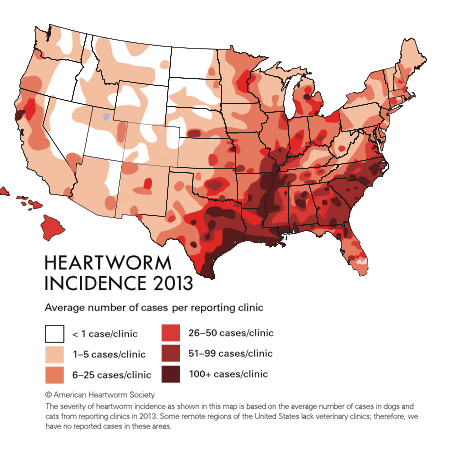
Heartworm is a potentially deadly parasite that is transmitted only by mosquitos, which pick up larval heartworms, called microfilaria, circulating in the bloodstream of infected animals.
Dogs and other canids, such as fox, wolves, and coyote, are considered the primary heartworm hosts, but these parasites can also affect other mammals, including cats, ferrets, and, in rare cases, humans.
There are treatments available, but prevention is the wisest approach to dealing with heartworms.
The canine heartworm prevalent in the United States goes by the scientific name Dirofilaria immitis or D. immitis. It does not spread from dog to dog but requires an intermediary, the mosquito, to infect new hosts.
The worms enter their host through a mosquito bite when it is taking a blood meal. Residue on the mosquito's mouthpiece carries immature worms called microfilaria (which are only about 1/100th of an inch long) from an infected animal to an uninfected one. The immature worms migrate travel through the bloodstream and, after about two months, settle in the right side of the heart, where they begin to grow.
They mature after six months and can live in the dog's body for seven years, each reaching a length of up to a foot and constantly producing offspring. After about a year, a dog may harbor hundreds of these worms, although 15 is the average burden. The worms cause inflammation and damage the heart, arteries, and lungs.
The first canine heartworms in the United States were discovered in 1856, in the southeast, according to Stanford University. It is most common in the Atlantic and Gulf coasts, but has been reported in all 50 states, according to the U.S. Food & Drug Administration. It has been diagnosed around the world.
There are few habitable places that are totally safe, especially if your travel with your dogs, and it's almost impossible to assess risk based on location. The American Heartworm Society (AHS) conducts surveys every three years of the number of cases reported by veterinarians and shelters throughout the country and produces a map of heartworm incidence.

Areas with large populations of wild or stray animals pose an enhanced risk, although even dogs who stay inside most of the time are not totally safe from a mosquito's bite. Also, pets being shipped from state to state may introduce heartworm into regions where it was historically not a problem. After Hurricane Katrina in 2005, about a quarter of a million pets traveled from the New Orleans area to new homes around the country. Some brought heartworm with them. AHS estimates that more than a million pets in the U.S. are infected.
In the early stages, there will be no signs of disease. About six months after the mosquito bite, blood tests will reveal the presence of antigens or microfilaria, according to the AHS. Other blood tests can measure antigens secreted by the female heartworm.
As the worms grow and multiply, the following symptoms will become evident, increasing in severity as the disease progresses. There are four classes of infection:
If your dog is diagnosed with heartworm through a blood test, your veterinarian will use different tests as confirmation. These include:
Once the diagnosis is confirmed, your vet will advise you to:
Treatment for heartworm is very hard on the dog, consisting of a drug contains arsenic and can have some serious side effects. That is why veterinarians are so adamant about yearly testing and administration of preventative compounds—what scientists call chemoprophylaxis. These medications are also effective against other parasites, such as roundworms, hookworms, fleas, and tapeworms. Different formulations are available for dogs and cats, and it's important that you do not mix these up.
Keep in mind that certain breeds, such as Collies and other herding dogs, have a genetic sensitivity to the drugs used in heartworm prevention. There are DNA tests to tell if your dog has a sensitivity to heartworm preventives.
Following is a list of some preventatives:
Sources: American Heartworm Society; Merck Veterinary Manual; Centers for Disease Control and Prevention
 Homemade Tips for Keeping a Dog From Licking an Incision
Homemade Tips for Keeping a Dog From Licking a
Homemade Tips for Keeping a Dog From Licking an Incision
Homemade Tips for Keeping a Dog From Licking a
 Healthy Dog
Your dog will rely on you to keep h
Healthy Dog
Your dog will rely on you to keep h
 Questions to Ask When Considering Pet Insurance for Your Dog
Cost of Care is Escalating
As vete
Questions to Ask When Considering Pet Insurance for Your Dog
Cost of Care is Escalating
As vete
 What Your 12-month-old Puppy Needs
What Your 12-month-old Puppy Needs
What Your 12-month-old Puppy Needs
What Your 12-month-old Puppy Needs
 Advice from the Breeder: Tom Coen, Macdega Shetland Sheepdogs
My advice to others over the years
Advice from the Breeder: Tom Coen, Macdega Shetland Sheepdogs
My advice to others over the years
Copyright © 2005-2016 Pet Information All Rights Reserved
Contact us: www162date@outlook.com